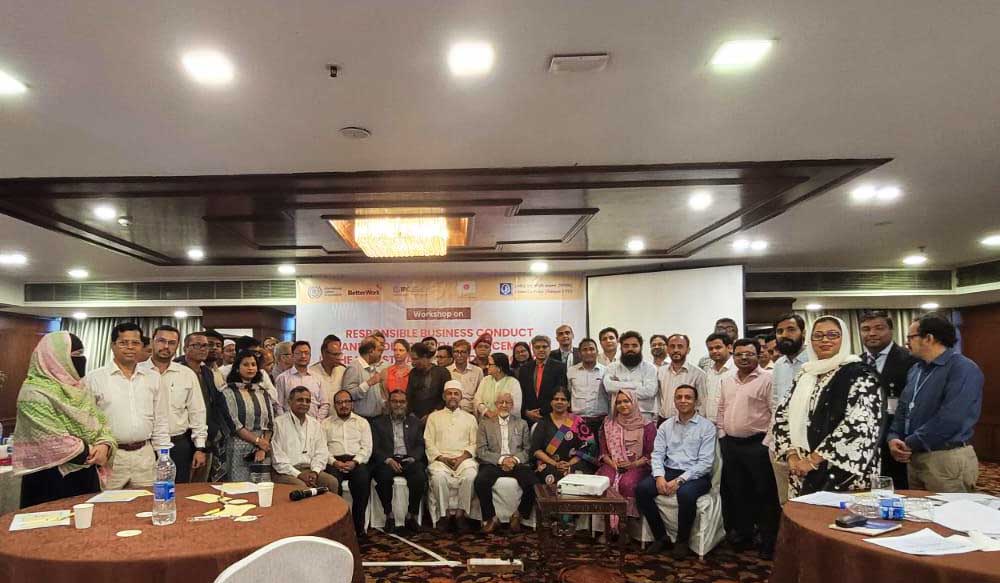
The Centre for Policy Dialogue (CPD), in partnership with Better Works Bangladesh (BWB), and International Labour Organization (ILO), organised a workshop titled ‘Responsible Business Conduct (RBC) and Productivity Enhancement in the Industrial Sector of Bangladesh: Tripartite Consultation with the Government of Bangladesh, Employers’ Associations and Workers Organisations’ on Wednesday, 24 April, 2024. Previously, two workshops were conducted — one focused on gathering insights from workers’ organisations, and the other aimed to equip employers with knowledge of RBC while soliciting insights and recommendations from them.
However, this workshop marked a significant milestone as it brought together government officials, employers’ associations, and workers’ organisations. Its focus was on identifying possible solutions to develop an RBC action plan.
In his introductory remarks, Mr Mohamad Anis Agung Nugroho, Programme Manager, Better Works Bangladesh, referenced Nelson Mandela, stating, ‘It’s forgiven but not forgotten’. He used this quote to underscore the importance of remembering past lessons and striving for improvement. Mr Nugroho emphasised that RBC is now a crucial requirement for buyers, presenting an opportunity for progress.
Ms Laetitia Weibel Roberts, Chief Technical Adviser, International Labour Organization (ILO), encouraged participants to engage in detailed brainstorming sessions to thoroughly analyse existing challenges. She emphasised the importance of considering potential short-term, medium-term, and long-term solutions to address these challenges effectively.
In his keynote presentation, Dr Khondaker Golam Moazzem, Research Director, CPD, addressed a spectrum of challenges including legal and regulatory, institutional, operational, and sectoral. Four groups were formed based on the types of challenges identified, and he encouraged each group to propose solutions to address the respective challenges.
Several legal and regulatory challenges have been identified, including the weak implementation of laws, the neglect of white-collar workers from labour laws, ambiguity regarding the coverage of workers under labour laws, oversight of emerging service industries in policies and laws, inadequate protection for informal sectors and informal workers under labour law, the absence of clear definitions for intellectual workers in law, and the frequent exclusion of workers from the policy and lawmaking process.
The first group focused on addressing these challenges by proposing the inclusion of all sectors within the legal framework, considering their unique characteristics. They emphasised the need for robust implementation of existing laws and the enactment of new legislation where necessary. Additionally, they suggested clarifying the definitions of various types of workers before making amendments to existing laws. Moreover, the group recommended identifying emerging service industries and adapting policies and laws accordingly.
Some institutional challenges identified include the inadequate adherence to RBC-related rules and policies at the factory level, a lack of service rules in certain sectors like the frozen food industry, a shortage of skilled workers in Bangladesh leading to increased vulnerability to exploitation, confidentiality of inspection reports hindering RBC tracking efforts, and irregular factory monitoring due to corruption.
The second group was tasked with addressing these challenges. They proposed the formation and active engagement of trade unions to ensure compliance with RBC-related policies. The Ministry of Labour and Employment (MOLE) should facilitate an environment conducive to forming trade unions, prioritising this within the next financial year. It was suggested that each sector and organisation should formulate their own service rules, tailored to their business nature, with monitoring by the Department of Inspection for Factories and Establishments (DIFE). Additionally, there should be increased awareness regarding worker exploitation, with employers being held accountable. Furthermore, efforts should be made to bring the non-RMG informal sector under national laws for better regulation.
Dr Moazzem highlighted the operational challenges such as the absence of labour unions in many factories, depriving workers of a platform to address their grievances; inconsistent adherence to working hours, leading to instances of overworking among workers; lack of awareness among workers regarding productivity-related matters; employers’ perception of workers as inferior, posing obstacles to ensuring RBC; unfair distribution of profits among workers, and the absence of collective bargaining even in factories with existing trade unions.
The third group tackled these challenges and put forth several recommendations. They suggested that establishing a registered trade union in factories should be made mandatory, in accordance with labour laws, and facilitated by the workers themselves. Additionally, they proposed that working hours should be standardised as per legal requirements, with the introduction of digital attendance systems within 2 to 3 months. Furthermore, they recommended organising workshops or training sessions to enhance awareness among workers about productivity-related issues. It was emphasised that workers should be treated in accordance with Bangladesh’s labour laws, ensuring their rights and protections. Finally, they suggested implementing profit-sharing schemes in line with Bangladesh’s labour laws, facilitated through negotiation processes.
The sectoral challenges identified include variations in the progress towards ensuring RBC across different sectors, posing difficulties in coordinating actions effectively. The service sectors notably lack adequate attention in terms of RBC-related laws, policies, and initiatives. Despite its prominence, even the garment industry is facing shortcomings, with recent efforts such as Bangladesh Garment Manufacturers and Exporters Association (BGMEA) conducting trainings on German Human Rights Due Diligence (HRDD) laws indicating areas for improvement. Furthermore, the tech industry in Bangladesh lacks specific laws addressing RBC concerns.
The fourth and final group tackled these challenges by proposing several measures. They recommended conducting stakeholder consultations to develop a common checklist and stakeholder mapping tool. They emphasised the importance of including all service sectors in the National Action Plan (NAP) and establishing a common platform for discussion. Additionally, they suggested raising awareness about RBC and enhancing capacity through seminars and training sessions. Furthermore, they advocated for the inclusion of RBC provisions in IT-related laws to ensure comprehensive coverage and enforcement.
By the end of the workshop, the participants gained knowledge and better understanding of RBC, and had explored potential solutions to the current challenges.


